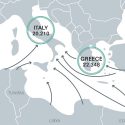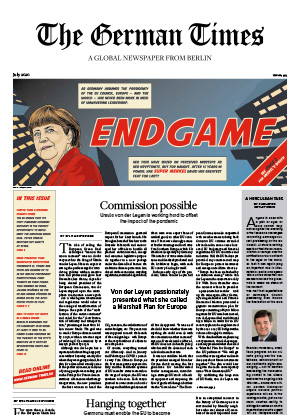The EU has to become a stronger foreign policy actor
For more than a decade, the European Union has been in constant crisis mode – from the financial and the refugee crises to the seemingly never-ending Brexit negotiations. The COVID-19 pandemic is more than just the newest addition to this conglomerate of challenges that former European Commission President Jean-Claude Juncker has dubbed Europe’s “polycrisis.” The economic and political repercussions of the pandemic are so severe that European leaders cannot resort to their usual tactics of incremental adaptation. This time, it will simply not be enough.
With the European Union at the brink, all eyes have turned to Germany. This is not just because Berlin happens to hold the EU Council presidency for the second half of 2020 – although this role does put the country in the driver’s seat. All across Europe, governments are looking for German leadership because – whether it likes it or not – Germany has become Europe’s “indispensable nation,” as then-Polish Foreign Minister Radosław Sikorksi proclaimed in 2011.
This does not mean that Germany should assume the role of hegemon in the European Union or that it could or should actually lead alone. It means that, without German leadership, there is not much hope for the EU to successfully cope with the challenges it is facing. Germany assuming a forward-looking leadership position, while not alone sufficient for Europe’s economic recovery and the development of a truly common European foreign and security policy, is one necessary condition.
For Germany, there is no more vital national interest than the survival of the European Union – for both economic and political reasons. While we often discuss our economic dependence on exports to China, it is the European single market that will determine the future of the German economy, which would be devastated if European integration were to unravel.
As Chancellor Angela Merkel recently noted, “Germany will only fare well in the long term if Europe fares well.” In political terms as well, Germany is dependent on European cooperation. It is an exceptional moment in the history of Germany as it is surrounded by friendly neighbors who are (almost all) members of its most important international institutions, the EU and NATO.
Our security and our political influence in the world depend on these partnerships. In a world increasingly shaped by great-power strategic rivalries and transnational risks, the European nation-state alone offers no refuge – not even for the most populous member state of the European Union.
How Germany and its partners deal today with the pandemic and its repercussions will shape the European Union of tomorrow. Germany could become Europe’s “enabling power” and, together with its partners, take decisive steps toward a stronger EU, endowing it with the necessary resources and capabilities to act effectively where nation-states cannot.
Or Europeans could watch the return of more nationalist policies and all that comes with them – the ultimate nightmare for Germany. This is why Berlin must embrace a European imperative.
Whatever it does in the months ahead, Germany should define and prioritize its actions according to two criteria: first, whether they enhance the EU’s ability to recover economically and politically; and second, whether they enable the EU to become a more credible international actor, able to protect its values, interests, and sovereignty in an increasingly harsh international security environment.
Fortunately, German elites seem to have understood that the pandemic is the final wake-up call. The recent Franco-German initiative for a recovery fund may indeed be a historic step for European integration. It sends an explicit and powerful signal of empathy and solidarity – a message so sorely missed of late. If adopted, it will hopefully help the whole of Europe to recover and indeed prosper.
Yet, German leadership will also be needed in strengthening Europe’s position in the world. Given the changing character of the trans-Atlantic partnership and the more confrontational policies of both Beijing and Moscow, Berlin should double down on efforts to enable the European Union to defend its values, its interests and its sovereignty in the world.
As EU High Representative for Foreign Affairs and Security Policy Josep Borrell has repeatedly argued: “In a competitive environment, Europeans need to relearn the language of power.” But the EU will not be able to speak the language of power as long as Germany does not.
Although the Europeans should stick to their instincts and try to forge rules-based solutions within multilateral institutions, they should do so from a position of cohesive strength and based on reciprocity, recognizing that other actors may not wish to share our rules-based approach. Collectively, Europe, at least in theory, has the power and the capability to make its voice heard and ensure that it does not fall victim to 21st-century power politics. As Benjamin Franklin once said: “We must, indeed, all hang together or, most assuredly, we shall all hang separately.”
If today holds an historic mission for Germany, it is this: Keeping the EU together and enabling it to become a stronger foreign policy actor in the world.
Wolfgang Ischinger
Ambassador Wolfgang Ischinger is Chairman of the Munich Security Conference and Senior Professor for Security Policy and Diplomatic Practice at the Hertie School in Berlin.



